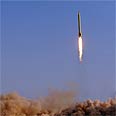
An asymmetric conflict
Op-ed: Price Iran willing to pay for destroying Israel proves objective is detached from any conventional strategic guideline
Considering the possibility that it may break out in a short time, the conflict between Israel and Iran has become an increasingly hot topic. Pro/against war activists engage in speculations concerning the soundness of their respective point of view and analysts keep on underlying what are now general lines that are almost engraved in the subconscious of anyone caring about the region.
As this ballet of opinions is gaining momentum, civilian and military planners may be on their way to surprise all the players mentioned before.
During the last few weeks, a lot of space has been dedicated to the study of the characteristics an Iranian response to an Israeli preventive strike could have. The word “asymmetric” is often used to describe Iranian military capabilities. Its ground forces exploit the Revolutionary Guard to guarantee the Islamic Republic with power projection. The use of terrorist groups as proxies and the threat of localized terrorist attacks are to be read in that same way.
The Iranian navy, with its maneuverable speed boats along with its strategy based upon deploying vast quantity of mines does not abide by the conventional tenets of maritime warfare. The development of a massive ballistic missile arsenal is meant to circumvent Tehran's absolute lack of air superiority. In other words, since the 1980s Iran has been standardizing the use of guerrilla and terrorist activities inside its own armed forces to gain a minor strategic advantage.
When defining the possible conflict as an asymmetric one a point is often missed: the psychology of it.
Since 1948, all conventional wars against state actors have been - for Israel - existential ones. With its extremely limited strategic depth the Jewish State cannot compromise about its defensive positions, either they hold and the counter attack is effective or the country may cease to exist in less than a week.
If that has been true, and to some extent it still is, none of the conflicts in which Israel has taken part have been perceived as total wars. None of them were meant to annihilate the enemy’s population or state. From the Egyptian and Syrian armies, to the terrorist movements in Lebanon and Gaza the objective has always been limited to the belligerent war making capabilities.
Terrorist campaign
The destruction of Hezbollah would in no way imply the political goal to suppress Lebanon as a country. The reason why Israel is maintaining this strategic logic is that the final goal is peace and the use of force is perceived through the need to weaken parties opposed to it. None of the recent talks over a preventive strike against Iran are aimed at erasing Iran as a nation and a state.
On the other hand, since 1948 all regional actors waging war against Israel have had an absolute vision of the conflict. From ‘driving the Jews to the sea’ to equating Israel to a tumor that must be removed, the strategic idea behind all political and military action taken against the Jewish State has been the total destruction of the state itself.
The 1973 Yom Kippur War is now presented as a limited conflict which Sadat would have waged to gain a better negotiating position. It is nevertheless difficult to believe that if the Egyptian and Syrians wouldn’t have been driven back by successful Israeli counter attacks they wouldn’t have taken over the entirety of Israeli territory.
The latest round of tensions in the Middle East, which sees Tehran at its center, is clearly an absolute struggle for Israel enemies. The protection of Iranian nuclear facilities is not seen merely as part of national policy, but as a vital national interest aimed at enabling Tehran to sooner or later keep on trying to destroy Israel.
Realist analysts and activists against the war point out to previous cases of nuclear deterrence. From the Cold War to the Pakistan/Indian and North/South Korea situations, it may seem that the acquisition of a nuclear weapon serves the goal of limiting the chances of an all-out conflict and creates a situation of mutually agreed red lines.
Such an analysis may well be out of touch with the reality linked to the Iranian regime. Tehran's strategic irrationality remains linked to the wish to destroy the Jewish State. The price the Islamic Republic is willing to pay for it, further indicates the objective is detached from any conventional strategic guideline. In addition to that, its ‘resistance’ rationale is used as an excuse to wage a terrorist campaign against civilian targets. Wishful thinking based on historical events that may not be compared to one another is not preventing a psychological asymmetry to grow in a period of escalating tensions.
Regardless of the actions that its government will decide to take, Israel’s security remains linked to its ability to defend its territory, protect its population and effectively defeat its irrational and uncompromising enemies. As long as the asymmetry in minds and discourses is part of the Middle Eastern equation, peace and security for Israel can only be achieved by an ensemble of measures aimed at deterring its adversaries and implicitly proving that the Jewish State cannot be “removed.”
Riccardo Dugulin holds a Master degree from the Paris School of International Affairs (Sciences Po) and is specialized in International Security. He is currently working in Paris for a Medical and Security Assistance company. He has worked for a number of leading think tanks in Washington DC, Dubai and Beirut. Personal website: www.riccardodugulin.com










